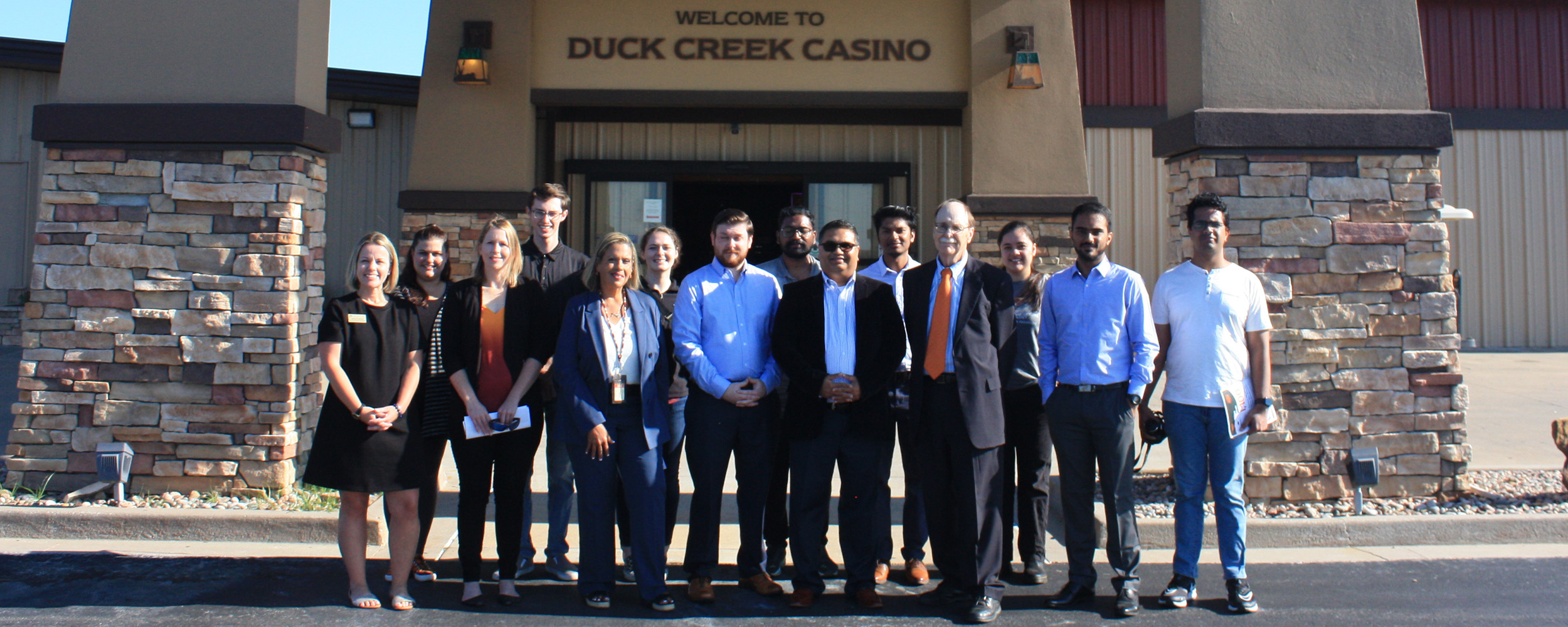
OSU IAC conducts milestone 1,100th audit
Wednesday, September 27, 2023
Media Contact: Jeff Hopper | Marketing Media Specialist | 405-744-2745 | jeff.hopper@okstate.edu
The Oklahoma State University Industrial Assessment Center has reached a significant milestone by recently completing its 1,100th energy assessment at Duck Creek Casino, underscoring its commitment to sustainability, innovation and industrial efficiency.
The IAC, a program funded by the U.S. Department of Energy's Office of Manufacturing Energy Supply Chain, is dedicated to assisting small and medium-sized enterprises such as manufacturing industries, commercial and institutional buildings. It also assists water and wastewater treatment plants in improving their energy efficiency, reducing waste and increasing competitiveness.
Since its inception, the center has made substantial contributions to the state's industrial landscape by providing invaluable recommendations to enhance operations while minimizing environmental impact.
The IAC has been a dynamic hub for advancing energy conservation, efficiency and sustainable development since 1982. With a strategic focus on energy challenges within communities, the center collaborates with local stakeholders and industries to provide innovative solutions and has already saved more than $130 million.
Rooted in OSU's land-grant mission, the IAC strives to enhance citizens' lives, drive economic growth and nurture workforce development. Operating across a four-state territory encompassing Oklahoma, Kansas, Arkansas and north Texas, the center delivers invaluable no-cost energy assessments to diverse entities, including small and medium-sized manufacturers, commercial buildings and water treatment plants.
"Reaching the 1,100th energy assessment milestone is a testament to the dedication and hard work of our team at the Industrial Assessment Center," said Dr. Hitesh Vora, director of the OSU IAC. "We're thrilled to celebrate our 1,100th assessment milestone at Duck Creek Casino. We take immense pride in our role as a resource for local businesses, helping them adopt sustainable practices that not only benefit their bottom line but also contribute to a greener future.
"This audit represents our commitment to providing valuable insights and solutions to businesses, particularly those within the Indian tribe community. The strategic shift to Duck Creek Casino symbolizes our dedication to this cause and highlights the impact of our work on a national scale."
Micah White — CEO for the Tribal Utility Authority of the Muscogee (Creek) Nation — along with Vora and a team of IAC students, casino employees and tribal members conducted a full-day assessment at Duck Creek Casino in Beggs, Oklahoma.
Duck Creek Casino was chosen for its significance within the tribe business landscape, in line with the visit of U.S. Sec. of Energy Jennifer M. Granholm and Second Gentleman Douglas Emhoff to OSU. During their visit, the OSU IAC was honored with the prestigious "Center of Excellence for IAC" award, a recognition of their dedication to energy efficiency. Granholm and Emhoff emphasized the importance of assisting tribes and their businesses, including casinos, to bring about positive change for Oklahoma's economic and environmental future.
"This milestone demonstrates the practical application of academic expertise to real-world challenges," said Dr. John Veenstra, interim dean of the College of Engineering, Architecture, and Technology. "The Industrial Assessment Center embodies our university's commitment to community engagement and sustainability."
OSU IAC is home to one of the oldest and most successful industrial energy-efficiency centers/offices in the nation and has been continuously operational since 1982. It is the first IAC among the 35 presently funded IACs in the nation to reach the 1,100th energy assessment milestone. Since 1982 and conducted over 1,100 energy assessments, all at no cost, with over $134 million of energy and cost savings (approximately 14.35 trillion BTU) and trained more than 240 OSU students.
The OSU IAC embodies a commitment to public impact research and community engagement. By seamlessly integrating academic expertise with industrial needs, the center actively contributes to the advancement of energy conservation, efficiency and sustainability within the industrial sector. The program's strategic alignment with OSU's priorities and interdisciplinary focus underscores its dedication to fueling growth, preparing the workforce and advancing K-12 STEM education. Key elements of its approach include:
- Energy Assessments for SMEs: It provides high-quality, value-added services, offering strategies to enhance energy efficiency, cybersecurity, smart manufacturing, energy management and more. The program's success is evidenced by its remarkable 45% implementation rate and proven track record of cost-effective recommendations.
- Innovative Partnerships: Collaborations with federal offices, state, tribal and local entities, utilities, and energy service providers; industry, and educational institutes to bolster its regional presence and extends the reach of energy assessments, fostering the next generation of competent energy engineers.
- Ongoing Grants: Multiple grants (around $11 million), including the $7 million "Great Plains Center of Excellence" Award from the DOE, further underscore the program's recognition and funding success. These grants enable the center to enhance energy education, expand student-led assessments and contribute to DOE initiatives.
- Applied Learning Opportunities: It empowers engineering and non-engineering students (more than 25) annually through a blend of classroom education, individual mentoring and hands-on experience. The future-focused energy engineering minor and graduate track underscore the center's commitment to workforce readiness.
Over the years, the IAC's impact has been far-reaching, assisting a diverse array of industries — from food processing and metal fabrication to chemical production and beyond. By conducting these assessments, the center has not only helped companies cut costs but has also collectively reduced energy consumption, lowering carbon emissions and mitigating the ecological footprint of the state's commercial and manufacturing sector.
“The consistent standard of outstanding performance of the Oklahoma State Industrial Assessment Center — both in terms of improving the competitiveness of small and medium-sized manufacturers and its impact on the development of an energy-savvy workforce through applied learning — has contributed to its longevity as a center and its recent selection as one of five IAC centers of excellence under the Bipartisan Infrastructure Law,” said John Smegal, IAC program lead within DOE’s Office of Manufacturing and Supply Chains.
